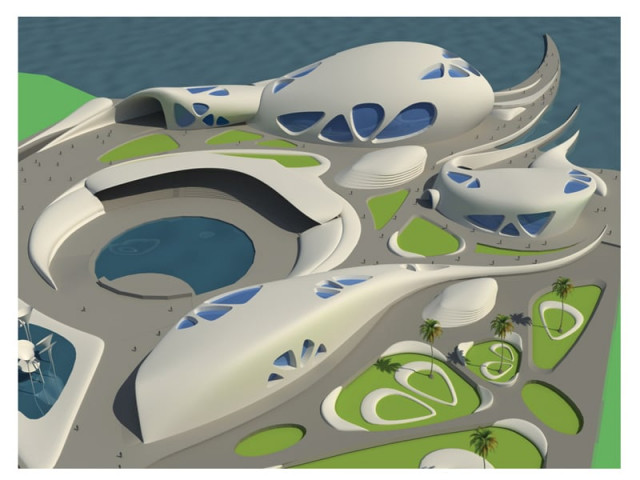Let's celebrate Karachi's coastal ecosystem
Karachi - despite supporting a precious marine ecology - does not have any aquamarine centres or theme parks

The proposed Aquaria Complex aims to take advantage of Karachi’s coastal location to serve as a complete recreational space. PHOTO COURTESY: FARHAN ANWAR
With growing awareness that global challenges such as climate change seriously threaten coastal cities - their sensitive ecosystems and their people - various measures are being taken to protect and conserve coastal land and resources against the likely threats of rising sea levels and increase in coastal calamites.
One way of protecting coastal and marine life and habitat is to increase public awareness of their existence and the benefits gained from conserving them so that public pressure is built for their protection. In many coastal cities, this is being done by establishing aquamarine centres and theme parks that not only offer informative and recreational benefits but also serve as facilities for conservation-focused scientific research.
Karachi - despite supporting a precious marine ecology characterised by dense mangrove forests, one of the world's most important green turtle nesting beach habitat and coastal habitats that attract significant resident and migratory bird population - is not that fortunate and is not served by any such facility, large or small.
While the relevant government departments fail to take any initiative and the private sector also has not considered investing in such a venture; exciting, innovative and workable conceptual and design ideas are coming from the academic realm. One such project is the final-year thesis, Aquaria Complex, prepared by Anam Yamin, a Dawood University of Engineering and Technology Department of Architecture student.
The proposed Aquaria Complex, a commercial and educational theme park, is aimed to serve as a complete recreational space for all age groups, displaying marine animals and plants; particularly oceanic, pelagic, fishes and mammals. In addition, the facility is also designed to serve as a space for facilitating education and scientific study.
The complex is proposed to be built along the coast and is also designed to feature outdoor pools and aquatic environments that enable visitors to see large and small fish and other marine life from below the water surface.
The centre is also designed to serve as an aquatic museum. In her design, Yamin has put emphasis on combining live aquarium animals with the expanded educational approach of museums. The themes of the exhibits will explore the historical, ecological, cultural, and artistic connection of man and sea. This, Yamin feels, will allow the aquarium to achieve the goal of educating visitors more intimately with the sea and give them a sense of their own responsibility for its preservation. Since the complex is proposed to be situated along the coast, the design also caters to facilitating exciting water sports options.
A grave injustice is being served to Karachi and its inhabitants by the city managers by not providing them with such a facility - a facility that also can offer hope for motivating people to demand protection of the fast depleting precious coastal ecosystems of the city. While the city government may lack the required funds and expertise to develop such a facility, it can at least ask the private sector to come forward.
Another fact that needs to be highlighted here is that not just this design project but many other innovative and well researched academic projects are being prepared in the academic institutes of higher learning in Karachi. It is high time that both the government and the private sector link up with academic institutions, both in facilitating such research work and also in finding ways to have the proposed ideas implemented.
The writer is an urban planner and runs a non-profit organisation based in Karachi, focusing on urban sustainability issues
Published in The Express Tribune, February 9th, 2015.



















COMMENTS
Comments are moderated and generally will be posted if they are on-topic and not abusive.
For more information, please see our Comments FAQ